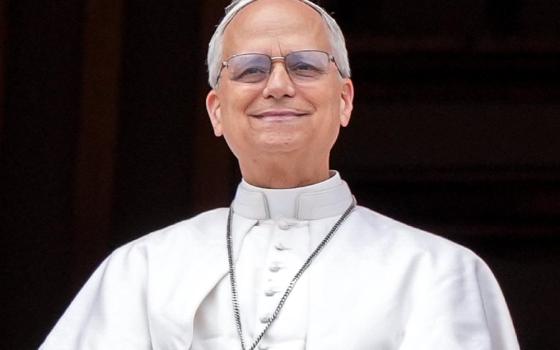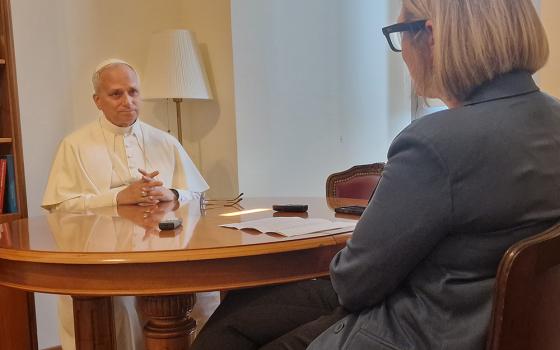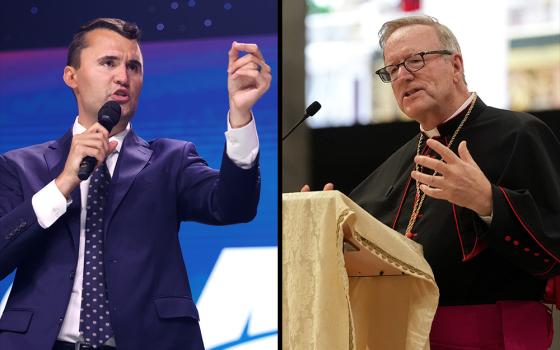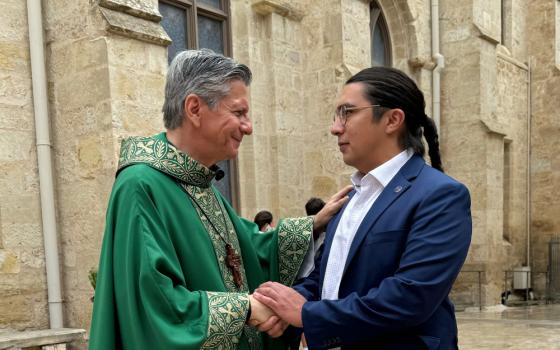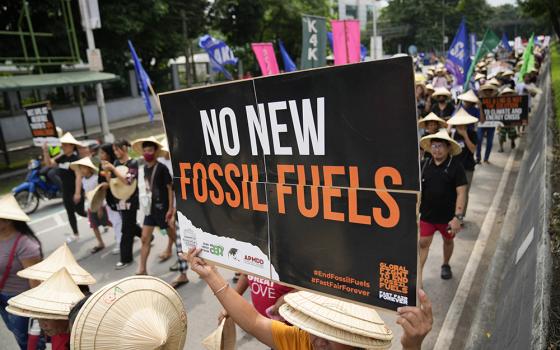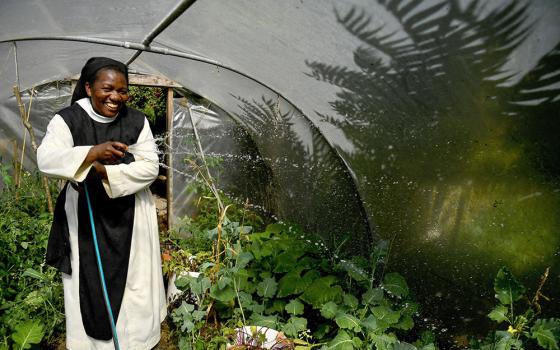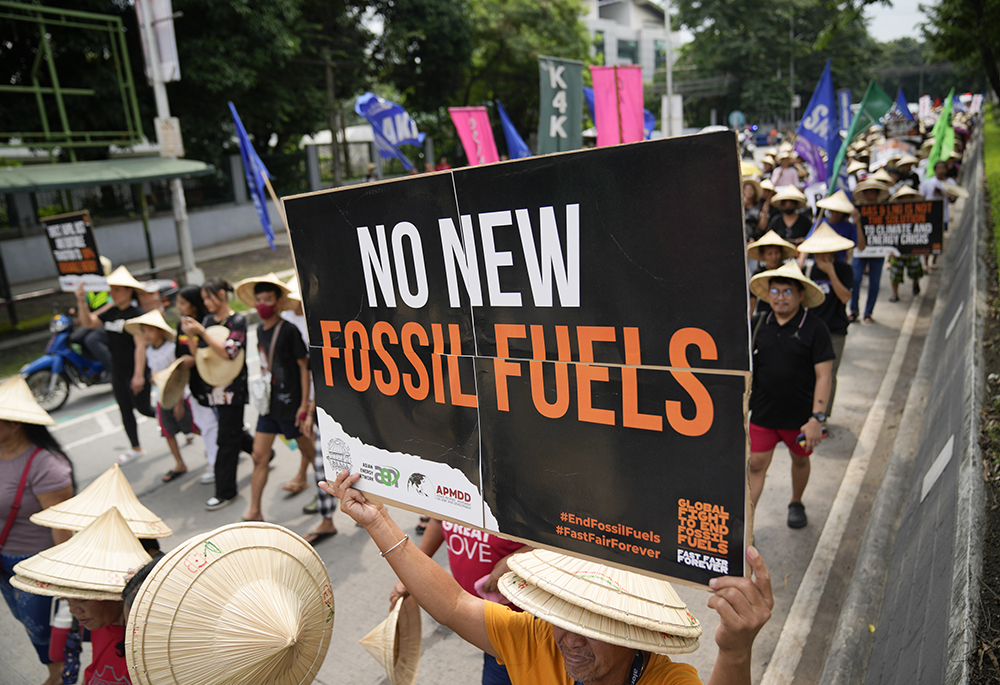
A protester holds a slogan as they join the global march to end fossil fuel on Sept. 15, 2023, in Quezon City, Philippines. (AP photo/Aaron Favila)
The Catholic Bishops' Conference of the Philippines publicly committed in 2022 to withdraw its finances no later than 2025 from banks with no clear policies for fossil fuel divestment. But Catholic leaders here have not yet followed through on these promises.
"A Decade of Divestment for Our Common Home," a new report by Living Laudato Si' Philippines on publicly disclosed shareholders' lists, showed more than 165 Catholic entities in the Philippines have shares in at least one of 16 corporations known to conduct or finance fossil fuels and mining operations from 2015 to 2024 — including nine archdioceses, 20 dioceses and several congregations, missionaries, universities and seminaries.
Since the publication of Pope Francis' encyclical "Laudato Si', on Care for Our Common Home" a decade ago, faith-based and civil society groups alike have advocated for the Catholic Church to figuratively "walk the talk" on responding to the ecological crisis, especially climate change, through a focus on social justice and caring for the environment.
So the pledge by the Philippines bishops' conference to leave destructive and extractive industries behind within the national church body of the world's third largest Catholic country was significant, albeit currently unfulfilled. Based on recent gatherings, it seems they are still discussing exactly how to achieve their goal, and still need to meet with several government agencies to help define a plan.
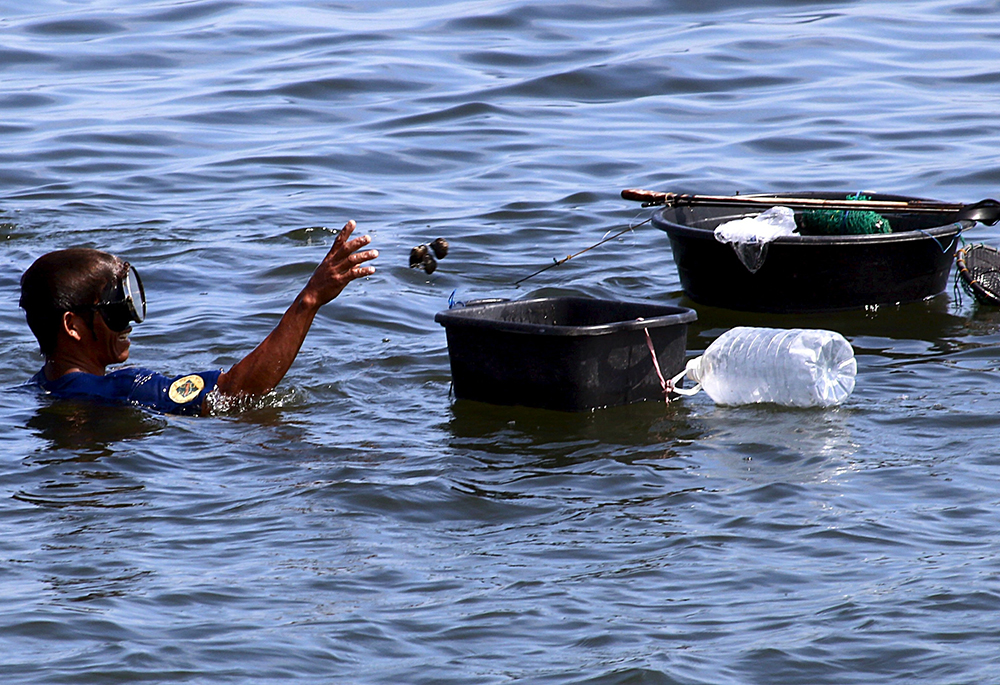
A fisherman collects sea shells in Manila Bay at Cavite City, near Manila, Philippines, July 23, 2015, the year of the publication of Pope Francis' encyclical "Laudato Si', on Care for Our Common Home." (CNS/Reuters/Romeo Ranoco)
Another indicator of the state of Catholic divestment in the country is efforts by the Archdiocese of Manila to shift to more sustainable financing aligned with Catholic social teaching. During the 2023 Season of Creation, it issued a statement about its divestment from coal and "other destructive businesses." But the new report's findings show a lack of full follow-through.
As of December 2024, archdiocesan shares in six corporations that meet the destructive criteria have not decreased in the past decade, gaining about 11 billion Philippine pesos in value (about $190,000,000). The largest contribution to these funds comes from its shares in the Bank of the Philippine Islands, in which it is currently the fifth-largest shareholder.
The Manila Archdiocese is also invested in San Miguel Corporation, the top gas financer in Southeast Asia, that is also involved in development aggression projects, from the construction of an airport north of Metro Manila to a proposed bridge to Boracay Island that would threaten local livelihoods and nearby environments.
The archdiocese is one of 167 Catholic shareholders who have invested in San Miguel Corporation in the past decade. Among them, only ten have partially or completely divested from the conglomerate. This resulted in a 16% decrease in total shares; however, similar to BPI, there was a 25% increase in share value across all Catholic equities.
The billions in Philippine pesos gained by such shares in the past decade exceed the measly millions worth of divestments in the corporations covered in the report. These numbers present a dilemma that the church leadership in the Philippines must face if they intend to meet their own 2025 target — living up to the Catholic mandate and teachings while ensuring enough resources to sustain their operations.
Some other local Catholic groups are effectively leading the way on divest-invest actions.
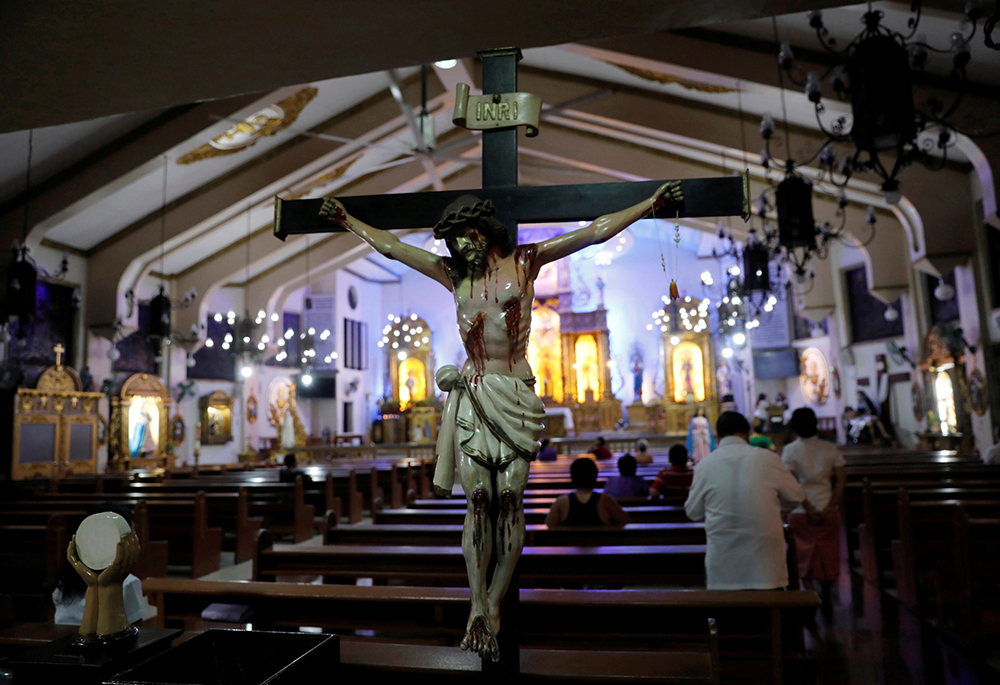
Members of a congregation pray during a Sept. 22, 2017, Mass at a Catholic church in Quezon City, Philippines. (CNS/Reuters/Dondi Tawatao)
A few Catholic organizations with operations in the Philippines have initiated their divestment, such as the Missionary Society of St. Columban. According to Columban Br. John Din, regional coordinator on justice, peace and integrity of creation, since their announcement in 2016, the group has increased their environmentally responsible investments, including in government bonds fueling sustainability, such as renewable energy.
Din cites Laudato Si' as an accelerator of this process, noting that "there was a commitment before, but it was really Laudato Si' that provided the big push for the whole society to divest. It gives you a sense that we are doing the right thing."
The Diocese of San Carlos in the province of Negros Occidental — long known as one of the greenest in the country, and led by environmental champion Bishop Gerardo Alminaza — has opted to avoid investing in fossil fuel companies, instead supporting local enterprises in neighboring provinces that are better aligned with church teaching.
One example is the Esprutingkle Group of Companies based in Antique, which is recognized for its innovative entrepreneurship across multiple businesses (i.e., hotel, retail) in the Philippines. The bishop said the Esprutingkle Group of Companies is dedicated to assisting dioceses and congregations, while also trying to avoid fossil fuel investments as much as possible.
Alminaza acknowledges that this approach is not yet the norm within the Philippine Catholic community. He said that the hesitancy of some dioceses to divest "springs a lot from their lack of knowledge and awareness" of how the process works. "They thought we would just have to withdraw right away," he said, and aren't aware it is a gradual process with "the opportunity to use their big investments there to make a difference."
For the bishops' conference of the Philippines to truly follow through on their commitment to more faith-consistent investing, its strategies must focus on imparting to dioceses and other actors a foundational understanding — divestment alone is incomplete. What happens after divestment is also important. As part of a just transition, divest-invest must account for both urgency and diligence.
Several other national Catholic bishops' conferences have pledged fossil fuel divestment, such as the Irish Catholic Bishops' Conference and the Association of Member Episcopal Conferences in East Africa, the umbrella association representing 11 national bishops' conferences in East Africa.
Advertisement
The U.S. Catholic bishops' conference — which has not divested — last updated their socially responsible investment guidelines in 2021. Those guidelines prohibit investing in things like abortion, weapons, pornography and tobacco for being out of line with church teaching, but on environment-related investments suggest first engaging fossil fuel companies before considering divestment from those falling short of the Paris Agreement goals. In 2024 the Diocese of San Diego was the first in the U.S. to publicly announce fossil fuel divestment.
Public pronouncements of divestment not only send the message that shareholders want more urgent climate action, but also that business as usual is over. This is an imperative that the Vatican has acknowledged not just in Laudato Si', but also in subsequent publications, most notably Mensuram Bonam in 2022, which provides guidance for faith-consistent investing for Catholics.
Guided by these church teachings, faith-based and civil society groups are pressuring Philippine banks to commit to fossil fuel divestment. Clergy members, including Alminaza, have delivered interventions calling for divest-invest in annual shareholders' meetings.
Among the few banks that have responded to these actions is BPI, which pledged to end its coal loans and bonds by 2030. In the past year, according to a report by the Center for Energy, Ecology, and Development, there was no coal or gas financing by any local bank — the first time this has happened, which is partially attributed to the collective advocacy for divest-invest.
But challenges remain. To achieve the 2025 target, dioceses need to know where their money is in the first place — many around the country do not know. They must gain financial literacy for strategic engagements with corporate leaders, investors and advocacy groups. This must be coupled with popularizing Laudato Si' itself across every level of faith communities.
Catholic leaders must remember their mandate is not to maximize returns, but to embody and promote the faith. Still, high returns can be achieved without fossil fuels and mining investments.
It is time for the global Catholic community to "walk the talk" on a swift transition away from fossil fuels toward renewable energy. The Philippine context shows this path is challenging, but not impossible. If Catholics are truly committed to investing in ways that align with faith values, it is not optional.
John Leo Algo is deputy executive director for programs and campaigns of Living Laudato Si' Philippines and led the development of the content of the "A Decade of Divestment for Our Common Home" report.

